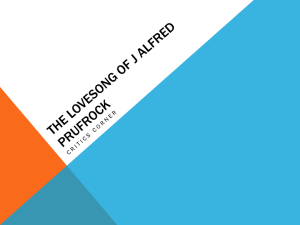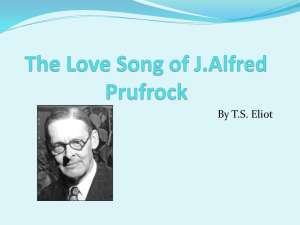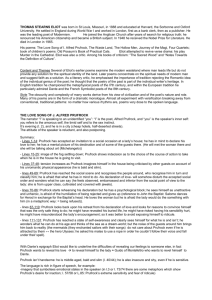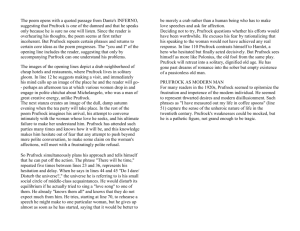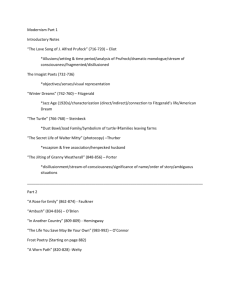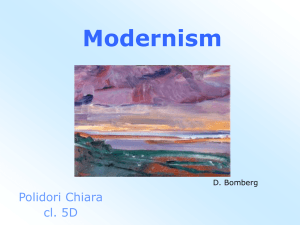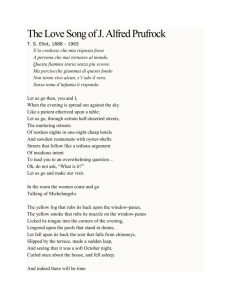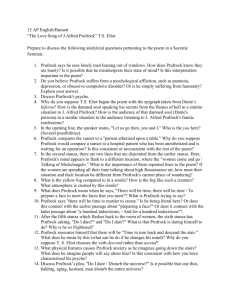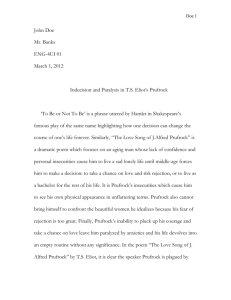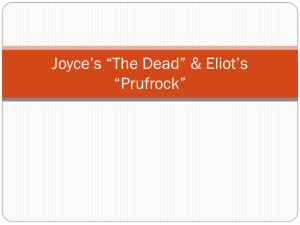The Love Song of J. Alfred Prufrock
advertisement
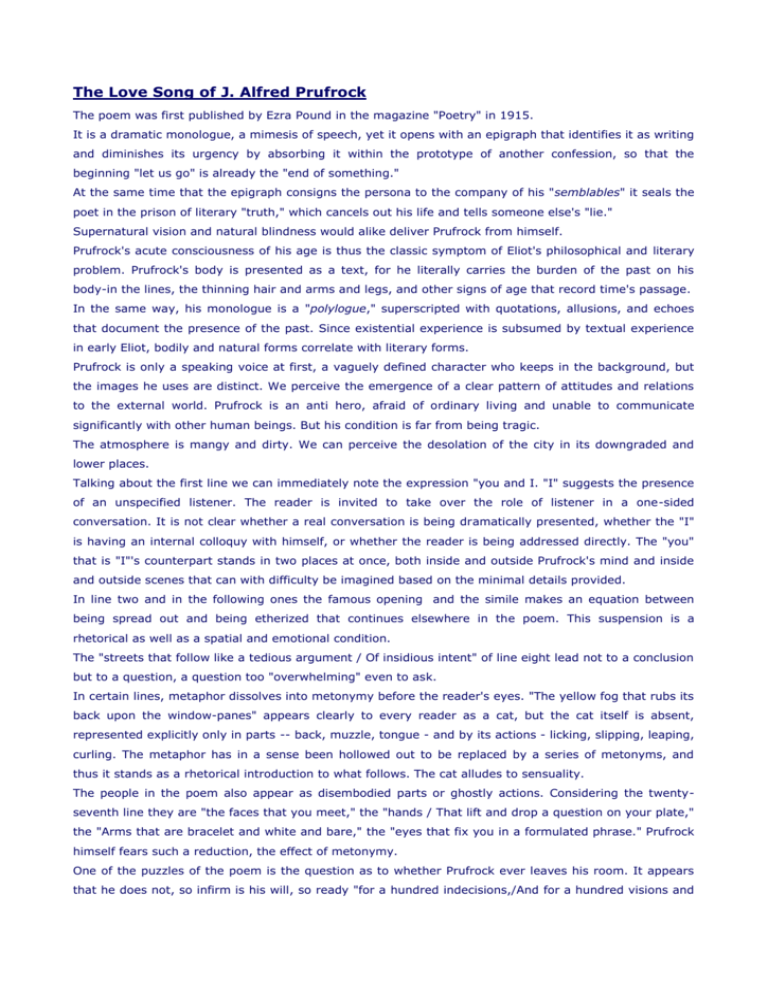
The Love Song of J. Alfred Prufrock The poem was first published by Ezra Pound in the magazine "Poetry" in 1915. It is a dramatic monologue, a mimesis of speech, yet it opens with an epigraph that identifies it as writing and diminishes its urgency by absorbing it within the prototype of another confession, so that the beginning "let us go" is already the "end of something." At the same time that the epigraph consigns the persona to the company of his "semblables" it seals the poet in the prison of literary "truth," which cancels out his life and tells someone else's "lie." Supernatural vision and natural blindness would alike deliver Prufrock from himself. Prufrock's acute consciousness of his age is thus the classic symptom of Eliot's philosophical and literary problem. Prufrock's body is presented as a text, for he literally carries the burden of the past on his body-in the lines, the thinning hair and arms and legs, and other signs of age that record time's passage. In the same way, his monologue is a "polylogue," superscripted with quotations, allusions, and echoes that document the presence of the past. Since existential experience is subsumed by textual experience in early Eliot, bodily and natural forms correlate with literary forms. Prufrock is only a speaking voice at first, a vaguely defined character who keeps in the background, but the images he uses are distinct. We perceive the emergence of a clear pattern of attitudes and relations to the external world. Prufrock is an anti hero, afraid of ordinary living and unable to communicate significantly with other human beings. But his condition is far from being tragic. The atmosphere is mangy and dirty. We can perceive the desolation of the city in its downgraded and lower places. Talking about the first line we can immediately note the expression "you and I. "I" suggests the presence of an unspecified listener. The reader is invited to take over the role of listener in a one-sided conversation. It is not clear whether a real conversation is being dramatically presented, whether the "I" is having an internal colloquy with himself, or whether the reader is being addressed directly. The "you" that is "I"'s counterpart stands in two places at once, both inside and outside Prufrock's mind and inside and outside scenes that can with difficulty be imagined based on the minimal details provided. In line two and in the following ones the famous opening and the simile makes an equation between being spread out and being etherized that continues elsewhere in the poem. This suspension is a rhetorical as well as a spatial and emotional condition. The "streets that follow like a tedious argument / Of insidious intent" of line eight lead not to a conclusion but to a question, a question too "overwhelming" even to ask. In certain lines, metaphor dissolves into metonymy before the reader's eyes. "The yellow fog that rubs its back upon the window-panes" appears clearly to every reader as a cat, but the cat itself is absent, represented explicitly only in parts -- back, muzzle, tongue - and by its actions - licking, slipping, leaping, curling. The metaphor has in a sense been hollowed out to be replaced by a series of metonyms, and thus it stands as a rhetorical introduction to what follows. The cat alludes to sensuality. The people in the poem also appear as disembodied parts or ghostly actions. Considering the twentyseventh line they are "the faces that you meet," the "hands / That lift and drop a question on your plate," the "Arms that are bracelet and white and bare," the "eyes that fix you in a formulated phrase." Prufrock himself fears such a reduction, the effect of metonymy. One of the puzzles of the poem is the question as to whether Prufrock ever leaves his room. It appears that he does not, so infirm is his will, so ready "for a hundred indecisions,/And for a hundred visions and revisions,/Before the taking of a toast and tea" (v.34). In another sense Prufrock would be unable to go anywhere, however hard he tried. However far Prufrock goes, he remains imprisoned in his own subjective space, and all his experience is imaginary. It seems to be some perception of this which keeps him in his room, content to imagine himself going through the streets, ascending the lady's stair, and telling her "all," like Lazarus back from the dead. There is no resurrection from the death which has undone him, and this is one meaning of the epigraph from Dante. The dread questions "How his hair is growing thin!" and "But how his arms and legs are thin" reduce Prufrock to certain body parts, the thinness of which stands in for the diminution caused by the rhetorical figures. What Prufrock fears has already been accomplished by his own rhetoric. An oddly similar relationship of part to whole governs Prufrock's conception of time. In a burst of confidence he asserts, "In a minute there is time / For decisions and revisions which a minute will reverse."(v.48) Yet he seems to quail before the very amplitude of possibility contained in time, so that all these decisions and revisions are foreclosed before they can be made. In line 49 Prufrock's prospective confidence in the fullness of time becomes a retrospective conviction that "I have known them an already, known them all: -- / Have known the evenings, mornings, afternoons. . . ." To know "all" already is to be paralyzed, disabled, because "all" is not full of possibility but paradoxically empty, constituted as it is by pure repetition, part on part on part. Talking about lines 49 and 99 we can perceive the concept of time. There is a systematic confusion of tenses and times in the poem, so that it is difficult to tell if certain images exist in past, present, future. Prufrock begins by talking of his visit to the lady as something yet to be done, and later talks of his failure to make the visit as something long past ("And would it have been worth it, after all,/Would it have been worth while". Like the women talking of Michelangelo, he exists in an eternal present, a frozen time in which everything that might possibly happen to him is as if it had already happened: "For I have known them all already, known them all". In this time of endless repetition Prufrock cannot disturb the universe even if he should presume to try to do so. Everything that might happen is foreknown, and in a world where only one mind exists the foreknown has in effect already happened and no action is possible. Prufrock's infirmity of will is not so much a moral deficiency as a consequence of his subjectivism In lines 55 and 63 we see the same verse. In a figure that exactly parallels the bodily metonymies, time becomes a collection of individual parts, just as the poem's human denizens had been little more than parts: "And I have known the eyes already, known them all"; "And I have known the arms already known them all." The instantaneous movement from part to whole, from eyes, arms, evenings, mornings, to "all," expresses the emptiness between, the gap between dispersed parts and an oppressive whole made of purely serial repetition. The very reduction of human beings to parts of themselves and of time to episodes makes it impossible to conceive of any whole different from this empty, repetitious "and". Talking about the same line (And I have known the eyes already, known them all-The eyes that fix you in a formulated phrase,-And when I am formulated, sprawling on a pin,-When I am pinned and wriggling on the wall,-Then how should I begin-To spit out all the butt-ends of my days and ways?-And how should I presume?) the physical and psychological enervation of Eliot's early personae may be read in part as correlatives of his literary situation; states his problem. 2 In his critical replay of the poetic process, Eliot remarks that the poet expresses not a personality but a particular medium. The particular medium expressed in "Prufrock" is a confession or a dramatic monologue. The you-I split being the formal ground of his medium, Prufrock's problem is in fact the problem the expressive medium introduces, and this identification of the formal and rhetorical dimensions of the medium with the emotion or psychic burden of the speaker makes for the airless closure of the poem. And if Prufrock's problem coincides with the dynamics of Eliot's particular medium of dramatic monologue, Eliot's problem coincides with the dynamics of the poetic medium itself; just as Prufrock is paralyzed by his consciousness of the other, his author is paralyzed by his consciousness of the tradition. The five-line interlude ending on "the floors of silent seas" forms an encapsulated version of the remainder of the poem. A return to images of distension and distracting sensuality provokes a final impulse toward violent imposition of the will which ends, like previous thoughts of disturbing the universe, in ruthless self-mockery. In line 83the image of decapitation parodies the theme of disconnected being and provides for at least a negative definition of the self: "I am no prophet." Referring to line 90 and the following ones "Would it have been worth while,-To have bitten off the matter with a smile,-To have squeezed the universe into a ball-To roll it towards some overwhelming question,-To say: "I am Lazarus, come from the dead, Come back to tell you all, I shall tell you all." the tense has quietly shifted from present to past, and the speaker offers a series of prolonged interrogatives on the consequences of action not taken what might have been"; the language and imagery of this passage enact with renewed intensity the recurring drama of mental conflict. The infinitives in this passage--to have bitten, to have squeezed, to roll--conform to the poem's widespread use of transitive verbs of direct action in expressing the speaker's violent impulse to combat the forces of disorder: to murder and create, to disturb the universe, to spit out all the butt-ends, to force the moment. Referring to line 97 once more the idea of language joins with images of purpose, only this time in such hyperbolic fashion that the ultimate failure of discourse strikes one as inevitable: "That is not what I meant at all." Prufrock’s vision is incommunicable. The lady is also imprisoned in her own sphere, and the two spheres can never, like soap bubbles, become one. Each is impenetrable to the other. In the line "It is impossible to say just what I mean!" the dramatic character and his author meet, "uttering the words in unison, though perhaps with somewhat different meaning," and displaying the rhetorical advantage a dramatic poet holds. And Eliot's imprisoning his speaker in the very medium of expressive or even confessional speech may register his own intertextual interment in a medium inscribed with prototypes of original or central speech are codified in and reinforced by conventions precluding the possibility of saying "just what I mean. The speaker's failure to master language--"It is impossible to say just what I mean!"--leads in this case not to a statement on the inadequacy of words themselves, but rather reflects upon the speaker's own impotence. Line 120: The old man with rolled-up trouser bottoms has shrunk from his former size. Paradoxically, this 3 diminution of the outer self--the part of the mind concerned with imposing order on experience--brings about a corresponding expansion of the inner self. Time disappears in the same way. Space must be exterior to the self if movement through it is to be more than the following of a tedious argument in the mind. In the same way only an objective time can be other than the self, so that the flow of time can mean change for that self. But time, like space, has only a subjective existence for Prufrock. As a result, past, present, and future are equally immediate, and Prufrock is paralyzed. Like one of Bradley's finite centers, he "is not in time," and "contains [his] own past and future". Memories, ironic echoes of earlier poetry, present sensations, anticipations of what he might do in the future ("I grow old . . . I grow old . . . / I shall wear the bottoms of my trousers rolled" these are equally present. The poem's linguistic and thematic strategy consistently opposes active verbs to the passive voice which causes things to be spread out, etherized, smoothed, and stretched. It sets these infinitives against present participles, which are constantly muttering, sprawling, rubbing, scuttling, and settling. Finally, it opposes these transitive verbs to intransitive verbs which lie, linger, malinger, lean, curl, trail, wrap, slip, and sleep. A relative lack of modifiers and the absence of plural forms further distinguishes the passage cited above. By contrast the language of disordered experience, of imprecision and aimlessness, abounds in modifiers and plurals: restless nights, one-night cheap hotels, visions and revisions, the sunsets and the dooryards, and the sprinkled streets. For Eliot, poetic representation of a powerful female presence created difficulty in embodying the male. In order to do so, Eliot avoids envisioning the female, indeed, avoids attaching gender to bodies. We can see this process clearly in "The Love Song of J. Prufrock." The poem circles around not only an unarticulated question, as all readers agree, but also an unenvisioned center, the "one" whom Prufrock addresses. But even these synecdoche replacements are not clearly engendered. The bracelet arms and the skirts are specifically feminine, but the faces, the hands, the voices, the eyes are not. As if to displace the central human object it does not visualize, the poem projects images of the body onto the landscape (the sky, the streets, the fog), but these images, for all their marked intimation of sexuality, also avoid the designation of gender (the muttering retreats of restless nights, the fog that rubs, licks, and lingers). The poem, in these various ways, decomposes the body, making ambiguous its sexual identification. 4
